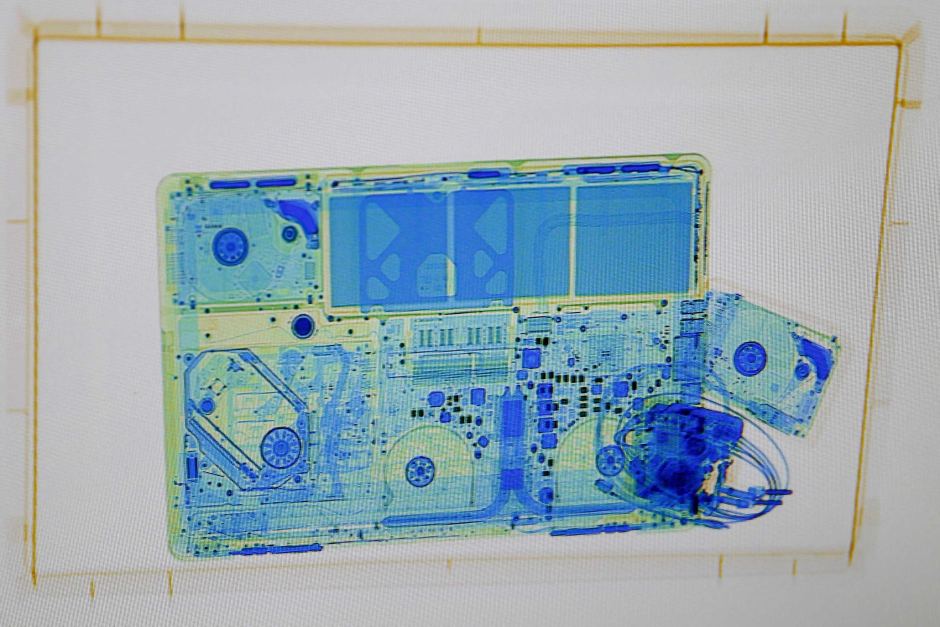Category: Terrorism / Air Transport / Industry / Business, Economics and Finance / World Politics
UK, US ban laptops on flights from Middle East amid bomb fears
Wednesday, 22 Mar 2017 04:05:58

A laptop is seen on the screen of an X-ray security scanner at Sarajevo International Airport in Sarajevo February 26, 2014. (Reuters: Dado Ruvic)
Britain has joined the United States in temporarily banning carry-on electronic devices on planes coming from certain airports in Muslim-majority countries in the Middle East and North Africa in response to unspecified security threats.
Key Points:
- US says terrorist attempts to attack 'aviation sector' intensifying
- Affected airlines include Emirates flying out of Dubai
- No explanation as to why restrictions do not apply to same flights when they leave the US
The US Department of Homeland Security said passengers traveling from those airports could not bring devices such as tablets, portable DVD players, laptops and cameras into the main cabin that are larger than a mobile phone.
Instead, such items must be in checked baggage, it said on Tuesday, local time.
At this stage, the Australian Government says it has no plans to enact a similar ban.
However, Australians travelling to the UK or US from one of the nominated countries — or with an affected airline — look set to be hit by the ban on electronics.
There is the possibility Australians making stopovers en route to the UK or US, for instance through countries such as Dubai or Abu Dhabi, could be affected.
Britain took similar steps to the US, with a spokesman for Prime Minister Theresa May saying that there would be curbs on electronic items in the main cabin on flights from six countries in the Middle East.
The moves were prompted by reports that militant groups want to smuggle explosive devices inside electronic gadgets, US officials told reporters on a conference call on Monday.
"The US government is concerned about terrorists' ongoing interest in targeting commercial aviation, including transportation hubs over the past two years," a US counter-terrorism official said in a statement.
"Our information indicates that terrorist groups' efforts to execute an attack against the aviation sector are intensifying."
A US government source said that while the restrictions arose from multiple reports of security threats, some very recent intelligence had arrived which helped to trigger the timing of the current alert.
The airports covered by the US restrictions are in Cairo; Istanbul; Kuwait City; Doha, Qatar; Casablanca, Morocco; Amman, Jordan; Riyadh and Jeddah, Saudi Arabia; and Dubai and Abu Dhabi in United Arab Emirates.
Those at affected airports are likely to experience long delays as airports adjust to the new security measures.
Officials said the decision had nothing to do with President Donald Trump's efforts to impose a travel ban on citizens of six majority-Muslim nations.
DHS spokeswoman Gillian Christensen said the government "did not target specific nations. We relied upon evaluated intelligence to determine which airports were affected."
On March 6, Trump signed a revised executive order barring citizens from Iran, Libya, Syria, Somalia, Sudan and Yemen from traveling to the United States for 90 days.
Two federal judges have halted parts of the ban although Trump has vowed to appeal.
The airports affected by the US electronics rules are served by nine airlines that fly directly from those cities to the United States about 50 times a day, senior government officials said.
Airlines act to comply
The carriers — Royal Jordanian Airlines, Egypt Air, Turkish Airlines, Saudi Arabian Airlines, Kuwait Airways , Royal Air Maroc, Qatar Airways, Emirates and Etihad Airways — have until Friday to heed the new policy, which took effect early on Tuesday and will be in place indefinitely.
Several of the carriers, including Turkish Airlines, Etihad and Qatar, said early on Tuesday that they were quickly moving to comply.
Royal Jordanian and Saudi Airlines said on Monday that they were immediately putting the directive into place.
An Emirates spokeswoman said the new security directive would last until October 14.
However, Ms Christensen termed that date "a placeholder for review" of the rule.
The policy does not affect any American carriers because none fly directly to the United States from the airports affected, officials said.
On Monday it emerged the US government had been considering the move since it learned of a threat several weeks ago.
US authorities believe there is a threat from plots similar to an incident a year ago in Somalia, where a bomb hidden in a laptop blew a hole in the side of a plane although failed to down it, another source said.
Officials did not explain why the restrictions only apply to travellers arriving in the United States and not for those same flights when they leave from there.
The rules do apply to US citizens traveling on those flights, but not to crew members on those foreign carriers.
Homeland Security will allow passengers to use larger approved medical devices.
Britain said its restrictions would apply to direct flights from Turkey, Lebanon, Jordan, Egypt, Tunisia and Saudi Arabia, and that devices larger than a normal-sized smartphone would have to be placed in the hold.
The British regulations affect British Airways, easyJet, Jet2, Monarch, Thomas Cook, Thomson , Atlas-Global, Pegasus, EgyptAir, Royal Jordanian, Middle East Airlines, Saudia, Turkish Airlines and Tunisair.
Reuters
- About Us
- |
- Terms of Use
- |
-
 RSS
RSS - |
- Privacy Policy
- |
- Contact Us
- |
- Shanghai Call Center: 962288
- |
- Tip-off hotline: 52920043
- 沪ICP证:沪ICP备05050403号-1
- |
- 互联网新闻信息服务许可证:31120180004
- |
- 网络视听许可证:0909346
- |
- 广播电视节目制作许可证:沪字第354号
- |
- 增值电信业务经营许可证:沪B2-20120012
Copyright © 1999- Shanghai Daily. All rights reserved.Preferably viewed with Internet Explorer 8 or newer browsers.




 Send to Kindle
Send to Kindle